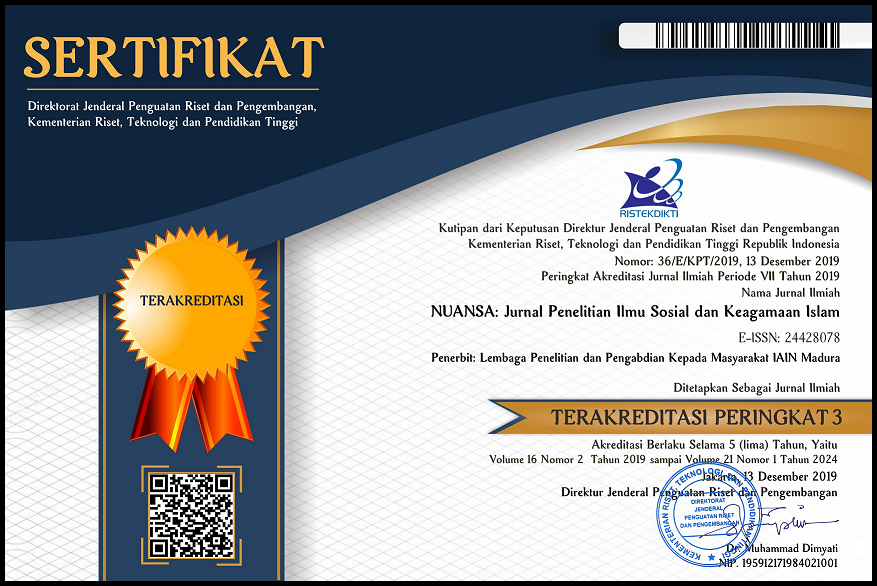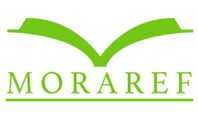MENUMBUHKAN SEMANGAT WIRAUSAHA MENUJU KEMANDIRIAN EKONOMI UMAT BERBASIS PESANTREN (Studi Kasus Di PP Darul Ulum Banyuanyar Pamekasan)
 Abstract views: 1147
,
Abstract views: 1147
,
 PDF downloads: 870
PDF downloads: 870
Abstract
Islamic boarding school is currently experiencing a tremendous value shift especially related to the world of work. Nowdays the development of entrepreneurship at schools has become a necessity or need, especially if it is associated with a boarding school education that emphasizes self-reliance, hard work, discipline and honest that support the spirit of entrepreneurship. Islamic boarding school of Darul Ulum Banyuanyar Pamekasan is one of the oldest boarding school in Madura, which has a firm commitment to the development of entrepreneurship among its students. Islamic boarding school of Darul Ulum Banyuanyar have a very big role in creating young entrepreneurs with innovative, independent, and creative as an effort to arouse the economic autonomy of students either at the time they are still at boarding school or later in the midle of society. From the results of this research, it is expected to be a reference and inspiration for other Islamic boarding schools in creating new entrepreneurs and arousing creative economic efforts to set up public economic autonomy
The present research uses qualitative descriptive technique. Data collection techniques include observation, interviews and documentation. Respondents in this study are leader and caretaker of Islamic boarding school of Darul Ulum Banyuanyar, business manager who owns Boarding School, students and alumni of the participating students as involved in entrepreneurship at Darul Ulum Islamic boarding school, Banyuanyar. While the secondary data in this study come from the supporting data in the form of books, journals, internet, papers, and literature or libraries that support other research studies.
The research result are: 1) Islamic boarding school of Darul Ulum Banyuanyar Pamekasan in fostering the entrepreneurial spirit among its students with vision for bearing Islamic generations that behave well, have applicable knowledge, and act scientifically. In practice, the students are given freedom in doing activities that support the achievement of the vision as long as those provide benefits to himself and others. 2) Creative business is run by the students and alumni of Islamic boarding school of Darul Ulum Banyuanyar Pamekasan including shops, products, services and finance sector. The entrepreneurial activities in the department store include the household segmentation to the local area around the pesantren. Production activities include the production of drinking water in the packaging of Nuri, the production of ice cubes, snack production, and handicraft production. While in the service sector include copying, typing and binding. And the financial activities of the establishment of BMT Nuri which already has 16 branches. 3) Islamic boarding school of Darul Ulum Banyuanyar, Pamekasan educate autonomy in all fields including economic autonomy. The attempts of the students for being autonomous contitute by participating in running a business during becoming students and their own business after diving in the community.
Downloads
References
Alma, Buchari, Kewirausahaan. Bandung: Alfabeta, 2003.
Ansori., Model Pengembangan Kewirausahaan Santri Melalui Pondok Pesantren Berbasis Budaya Agribisnis Tanaman Palawija. Didaktik, VOLUME 8, NOMOR 1 MARET 2014 – ISSN 1978-5089
Anwar, Saifiddin., Metode Penelitian, Yogyakarta: PT. Pustaka Pelajar 2001.
Arikunto, Sudarsimi., Prosedur Penelitian, Jakarta: Rieneka Cipta, 2002.
Barnawi, Mohammad Arifin, Schoolpreneurship: Membangkitkn Jiwa & Sikap Kewirausahaan Siswa, Jogjakarta : Ar-Ruzz Media, 2012.
Depag RI, Pola Pengembangan Pondok Pesantren, Jakarta : Depag RI, 2005.
Herdiansyah, Haris., Metodologi Penelitian Kualitatif untuk Ilmu- Ilmu Sosial. Jakarta: Salemba Humanika, 2010.
Huda, Chairul, Indonesia dalam Menghadapi MEA 2015, Harian Kompas (14 Maret 2015).
Kasmir, Kewirausahaan-Edisis Revisi, Jakarta: PT Rajagrafindo Persada, 2013.
Kuncoro, Mudrajad., Ekonomi Pembangunan (Teori, Masalah, dan Kebijakan), Edisi I. Yogyakarta: UPP AMP YKIN, 1997.
Mastuhu, Dinamika Sistem Pendidikan Pesantren, Jakarta: INIS, 1994.
Murti dan Salamah, Metodologi Penelitian Bisnis, Yogyakarta: Andi, 2005.
Muttaqin, Rizal., Kemandirian dan pemberdayaan ekonomi berbasis pesantren (Studi atas Peran Pondok Pesantren Al-Ittifaq Kecamatan Rancabali Kabupaten Bandung terhadap Kemandirian Eknomi Santri dan Pemberdayaan Ekonomi Masyarakat Sekitarnya). Jurnal Ekonomi Syariah Indonesia (JESI) Volume I, No.2 Des 2011
Nazir, Muhammad., Metode Penelitian. Jakarta: Ghalia Indonesia, 2005.
Nasution, Arman Hakim, dkk. Entrepreneurship, Membangun Spirit Teknopreneurship, Yogyakarta: ANDI, 2007.
Rahmat, Abdul. 2011. “Pendidikan Berwawasan Kewirausahaan pada Usia Dini”. Jurnal Pedagogika, Vol. 2 No. 1 Hal: 1. Universitas Negeri Gorontalo: Jurusan Pendidikan Luar Sekolah.
Reginald, Azel Raoul., Kewirausahaan Sosial Pada Pondok Pesantren Sidogiri Pasuruan. Jurnal Ekonomi Syariah Teori dan Terapan (JESTT) Vol. 1 No. 5 Mei 2014.
Suryana, Yuyus dan Kartib Bayu, Kewirausahaan: Pendekatan Karakteristik Wirausahawan Sukses, Jakarta: Kencana Prenada Media Group, 2010.
Yin, Robert K., Studi Kasus: Desain dan Metode. Edisi 1 Cetakan ke- 11. Jakarta: Rajawali Pers, 2012
The journal operates an Open Access policy under a Creative Commons Attribution-NonCommercial 4.0 International License (CC-BY-NC) 
Authors who publish with this journal agree to the following terms:
- Authors retain copyright and grant the journal right of first publication with the work simultaneously licensed under a Creative Commons Attribution License that allows others to share the work with an acknowledgement of the work's authorship and initial publication in this journal.
- Authors are able to enter into separate, additional contractual arrangements for the non-exclusive distribution of the journal's published version of the work (e.g., post it to an institutional repository or publish it in a book), with an acknowledgement of its initial publication in this journal.
- Authors are permitted and encouraged to post their work online (e.g., in institutional repositories or on their website) prior to and during the submission process, as it can lead to productive exchanges, as well as earlier and greater citation of published work.






















